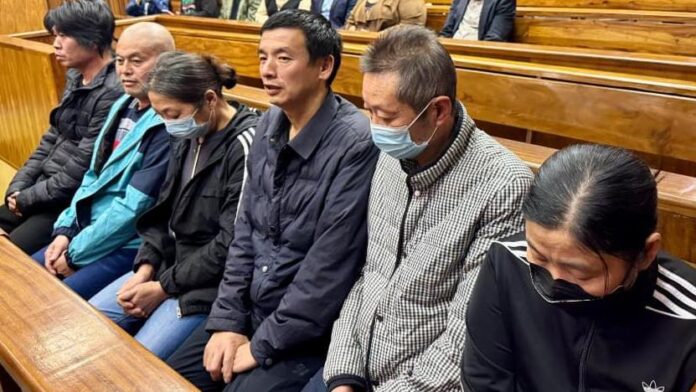A court in Johannesburg has sentenced seven Chinese nationals to 20 years in prison each for trafficking Malawian workers and forcing them into labor at a textile factory under brutal conditions.
The Gauteng South Division Court delivered the ruling Wednesday, nearly six years after police uncovered the operation in the industrial suburb of Village Deep. In a 2019 raid, officers found 91 undocumented Malawians trapped inside the factory compound, guarded by armed men and surrounded by razor wire.
Court documents identified the convicted traffickers as Shu-Uei Tsao, 42; Biao Ma, 50; Hui Chen, 50; Quin Li, 56; Zhou Jiaquing, 46; Junying Dai, 58; and Zhilian Zhang, 51. They were found guilty of human trafficking and violations of South Africa’s labor and immigration laws.
Prosecutors had asked for life sentences, arguing the workers were subjected to inhumane treatment that amounted to modern-day slavery. Testimony revealed that employees worked 11-hour shifts, seven days a week, without safety training or protective gear. They were denied the right to leave, forced to labor even on holidays, and banned from personal communication or bringing in food.
Several described being transported to the site in windowless trucks, only to be locked inside and ordered to operate defective machines that caused frequent injuries.
“They treated us like we were not human,” one victim said during the trial, describing months of confinement.
Many of the trafficked Malawians had previously worked in Chinese-owned factories in Malawi and were lured to South Africa with false promises of better pay and conditions. Instead, prosecutors said, they ended up trapped in what amounted to a prison factory.
Mr Tsao worked as a manager at the factory, named Beautiful City, while his co-accused were supervisors, according to local news site News24. The factory made inner cottons for blankets using recycled material.
South Africa’s prosecuting authority welcomed the sentence, with spokesperson Phindi Mjonondwane saying it would help “bolstering our fight against human trafficking”.
“Human trafficking has become a scourge in our country, we have become a destination as South Africa for human trafficking [due to] various reasons, including our porous borders,” Mjonondwane said.
The department of labour, which was part of the raid in 2019, also welcomed the sentence handed down as it urged for greater collaboration between government departments to “root out all these issues”.
The conviction highlights a wider problem across the continent, where foreign employers have been repeatedly accused of exploiting vulnerable African workers. In Malawi, Zambia, and the Democratic Republic of Congo, rights groups have documented cases of wage theft, unsafe workplaces, and outright abuse in mines, factories, and construction sites run by foreign nationals.
In Zambia, mining operations managed by outside interests have drawn criticism for subjecting employees to dangerous conditions with little accountability. In Sierra Leone and Ghana, locals have protested against foreign-operated fishing and mining firms accused of displacing communities and engaging in abusive labor practices.
South Africa’s ruling marks one of the harshest penalties yet imposed against traffickers on the continent. Rights advocates say it sets a precedent for other African nations struggling to confront foreign employers who take advantage of weak enforcement of labor laws.

